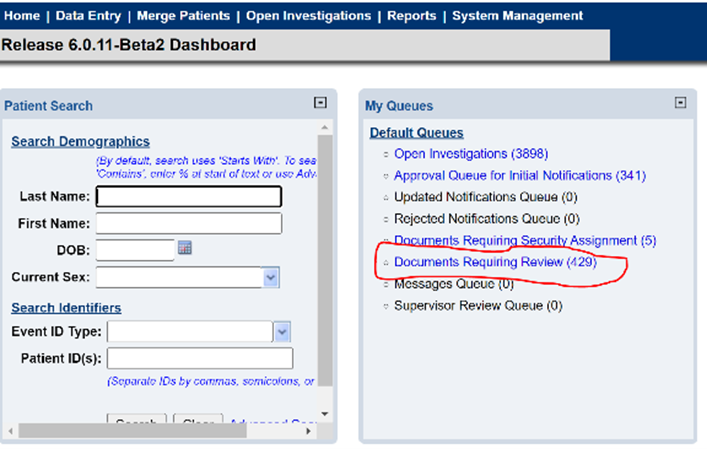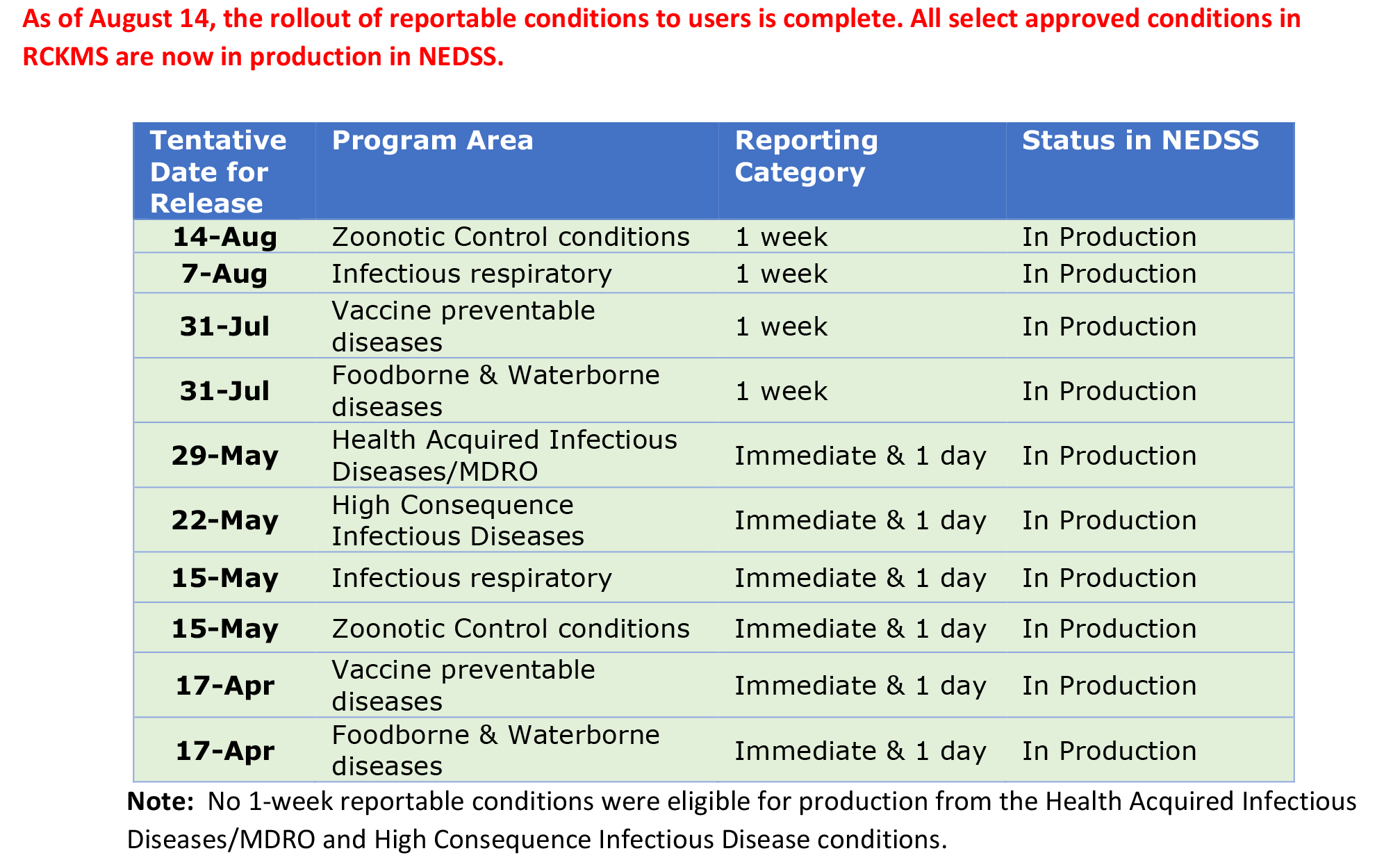eCR Resources for NEDSS Users
TerminologyeCR- Electronic case report/reporting: General term describing the automated exchange of reportable disease data from a hospital’s Electronic Health Record (EHR) system to public health. This term can be used broadly to refer to the overall process of exchanging data and may also be used interchangeably with the term eICR. |
Last updated: November 25, 2024
Quick Links to Sections
Previously Distributed Guidance on eCR | Video Trainings on eCR | Previous NBS User Call Recordings | Contact Information | Rollout Dates for Conditions | Where are eICR messages in NEDSS? | What eICRS require follow up at this time? | eICR Key Points | What rules govern the triggering of eICR messages from hospitals to NEDSS? | Healthcare Organizations Live with eICR in NEDSS | Known Limitations to eCR
Welcome Texas NEDSS Users!
The purpose of this page is to serve as a reference to Texas NEDSS users on electronic case reporting (eCR). All previously distributed communication, guidance, and training materials are included on this page. Users will receive email communication as this page is updated with the latest eCR content and guidance.
The schedule for release of eCR conditions has been updated below. One-week reportable conditions have been added to the schedule for release as noted below.
Healthcare Organizations Live with eICR in NEDSS
|
Baylor Scott & White Health Systems |
Live 9/1/22 |
|
|
Cook Children’s Hospital Health System |
Live 9/1/22 |
|
|
University of Texas Medical Branch (UTMB) Health System |
Live 4/17/22 |
|
|
Parkland Hospital Health System |
Live 3/30/23 |
|
|
United Regional |
Live 11/30/23 |
|
|
Texas Health Resources |
Live 11/06/23 |
|
|
HCA (Individual Organizations listed below in ALL CAPS.) |
Live 11/17/23 |
|
|
CORPUS CHRISTI MEDICAL CENTER |
CORPUS CHRISTI MEDICAL CENTER - BAY AREA |
Live |
|
DEL SOL MEDICAL CENTER |
DEL SOL MEDICAL CENTER |
Live |
|
HOUSTON HEALTHCARE |
HOUSTON HEALTHCARE CLEAR LAKE |
Live |
|
MEDICAL CITY- NORTH TEXAS |
MEDICAL CITY ALLIANCE |
Live |
|
METHODIST HOSPITAL |
METHODIST HOSPITAL - ATASCOSA |
Live |
|
RIO GRANDE REGIONAL HOSPITAL |
RIO GRANDE REGIONAL HOSPITAL |
Live |
|
ST DAVIDS HOSPITAL CENTRAL TEXAS |
HEART HOSPITAL OF AUSTIN |
Live |
|
VALLEY REGIONAL MEDICAL CENTER |
VALLEY REGIONAL MEDICAL CENTER |
Live |
|
WOMAN'S HOSPITAL OF TEXAS |
WOMAN'S HOSPITAL OF TEXAS |
Live |
|
Memorial Hermann |
Live 12/11/23 |
|
|
United Health Services |
Live 12/11/23 |
|
|
Providence Covenant Medical Center |
Live 3/8/24 |
|
|
Advent Health |
Live 3/8/24 |
|
|
UT Southwestern Hospital and Clinics |
Live 3/8/24 |
|
|
UTHEALTH |
Live 4/29/24 |
|
|
CHI St. Lukes |
Live 7/1/24 |
|
|
JPS Health Network |
Live: 9/13/24 |
|
|
Lavaca Medical Center |
Live: 9/13/24 |
|
|
CHRISTUS |
Live: 9/27/24 |
|
|
Laredo Medical Center |
Live: 10/28/24 |
|
|
University Medical Center of El Paso |
Live: 11/22/24 |
|
DSHS continues to work closely with several eligible healthcare organizations (HCOs) across Texas to onboard for eCR. DSHS will provide updates as new HCOs are added.
List of Facilities as reported by Healthcare OrganizationTo view a detailed list of the facilities in production in NEDSS, please see the following link. |
Previously distributed guidance on eCR sent to users via NEDSS@dshs.texas.gov. Please be sure to add this box as a contact so email is not sent to clutter. |
Video Trainings on eCR |
|
Previous NBS (NEDSS Base System) User Call Recordings (Live) |
Contact Information |
|
Where are eICR messages initially processed in NEDSS?

As a reminder, all eICRs for non-COVID-19 conditions will be processed into NEDSS via the Documents Requiring Review (DRR) queue in NEDSS. The DRR queue is the same queue where incoming electronic laboratory reports (ELRs) are processed. New eICRs are processed into the DRR queue every two hours.
COVID-19 eICRs are processed automatically,matched, and associated to an existing case investigation if applicable. For more information, please see COVID-19 eICR training to learn about the COVID-19 matching algorithm.
What eICRS require follow up at this time?
eICR Utilization
While there is currently no requirement for follow-up on eICRs, staff are encouraged to review messages to become familiar with content. Some eICR condition messages may be required for review in the future. Currently, local and regional jurisdictions have discretion as to how they use eICR information for follow-up. eICRs are being provided as a key informational resource to be added to surveillance and epidemiology staff toolkits. eICRs can aid in enriching case investigation data, especially for cases that were lost to follow up or have limited information.
One goal of eICR is to replace paper patient health records currently being received by fax or mail at health departments with an easy to navigate electronic record. It will also help eliminate manual abstractions being conducted onsite at a health care facility. This improves overall time efficiency and reduces costs for employees traveling to conduct abstractions.
Known Limitations to eICRs
A current shortcoming of the eCR process is that eICRs may be issued for conditions based on older events. For example, an eICR may be issued on a reportable condition that may have occurred several months or years ago. If a condition is still listed as an active problem in a patient’s EHR record, this may be the cause of the report being flagged for submission to public health. If you encounter an eICR that you confirm was triggered by an older event, no further action is needed.
Timeboxing Solution
To address this issue, CDC/CSTE are developing timeboxing solutions by condition. Timeboxing is an effort to reduce the number of eICR messages that are determined to be reportable to public health based on Encounter Diagnoses or Problem list entries that may not be related to the current instance of disease. This is accomplished by including date-based logic in RCKMS rules to assess the interval between report date and the date the condition was reported as a diagnosis or active problem in the eICR message. CDC/CSTE introduced timeboxing options in June 2023 for COVID-19, gonorrhea, Hepatitis C, mpox, and syphilis. CDC/CSTE is working on developing and implementing timeboxing functionality for additional conditions in 2024.
eICR Key Points
- eICRs are messages triggered by an onboarded hospital’s electronic health record (EHR) system to public health.
- The eICR contains information about a patient’s health encounter/visit to a health care facility for a notifiable condition. If key information from that health encounter meets the filtering criteria defined by the Reportable Condition Knowledge Management System (RCKMS) for that condition, then an eICR message will be triggered from the EHR to NEDSS.
- The eICR may include information such as patient demographics, encounter details, immunization records, administered medications, plan of treatment, reason for visit, results of testing completed during the encounter, and any miscellaneous notes provided by the physician/facility.
What rules govern the triggering of eICR messages from hospitals to NEDSS?
Reportable Conditions Knowledge Management System (RCKMS)
The Reportable Conditions Knowledge Management System (RCKMS) is an authoritative, real-time portal to improve disease surveillance. It is part of the Association for Public Health Laboratories (APHL) Informatics Messaging System (AIMS) platform. RCKMS stores comprehensive information on public health reporting requirements and acts as a decision support service (DSS) to determine if a potential case is reportable to public health.
The RCKMS criteria for a condition govern when an eICR is triggered and sent to NEDSS. A base template of RCKMS criteria is initially provided to states from CSTE and CDC. Texas is then able to customize the template for each condition available through RCKMS. Authoring each condition is conducted by DSHS Subject Matter Expert Epidemiology Team Leads in collaboration with PHID support staff. Specifications for how conditions are authored can be found via the Documentation link on the login page for NEDSS-https://txnedss.dshs.state.tx.us:8009/login/PHINDox/RCKMS%20Reporting%20Specifications/. Please note that this link is only accessible to users with access to NEDSS. Some conditions have been authored to trigger based on indication of a confirmatory lab in the patient’s electronic health record, but other conditions have been authored to also include some clinical indications where it is appropriate.
eICR User Report
A COVID-19 eICR report is already available in the NEDSS reports section. Users can pull a report that will detail COVID-19 case investigations that have a matching eICR associated in NEDSS. Please note that eICRs in production will initially only include the two healthcare organizations mentioned above, so there may not be any eICRs available yet for your area. A new user report for non-COVID-19 conditions will soon be available in NEDSS.

